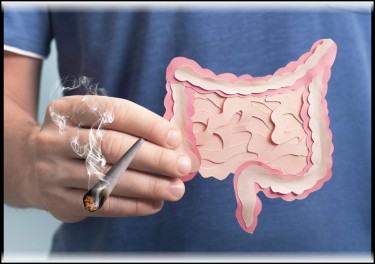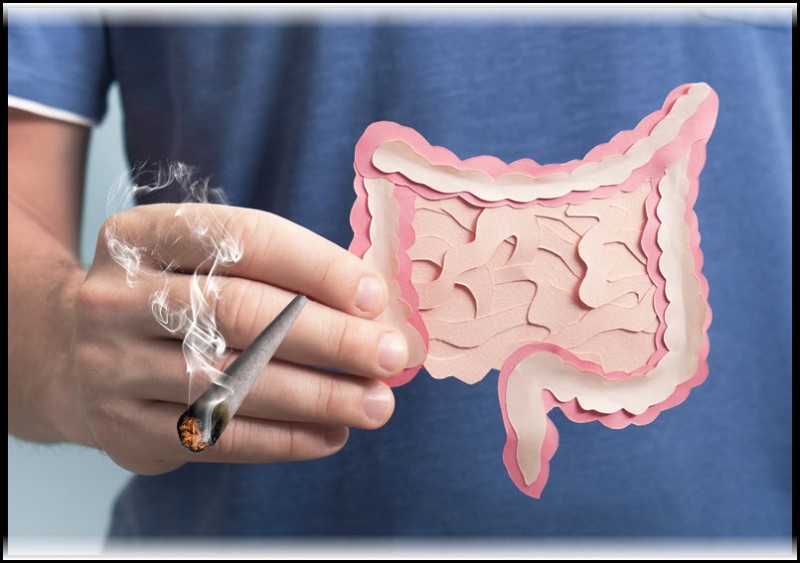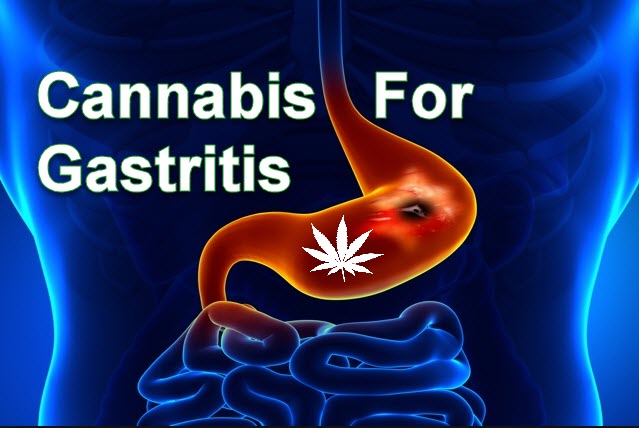
Digestive and gastrointestinal disorders affect millions of people worldwide.
These refer to a myriad of conditions affecting digestion, appetite, the bowels, gas, and inflammation to name a few. Cannabis has been proven many times over to help treat and prevent several digestive disorders that plague people everyday, some of them so debilitating that they prevent people from living normal lives.
The human body has endocannabinoid receptors CB1 and CB2 in the gut and stomach, all of which help to heal us from these digestive issues while improving motility, appetite, absorption, and overall gastrointestinal health when we medicate with cannabis – either THC, CBD, or both. However, you don’t necessarily have to consume cannabis orally through food, capsules or drinks in order to benefit your stomach; you can also smoke/vaporize, and place drops underneath your tongue especially since these consumption methods work fastest.
Consuming cannabis has proven to be beneficial for treating gastrointestinal conditions in many people especially since conventional treatments don’t always work as well; they also come with unwanted side effects.
Here are some of the common digestive disorders that cannabis can treat:
Inflammatory Bowel Disease
Inflammatory bowel syndrome (IBD) presents itself with a variety of symptoms including diarrhea, cramping, weight loss, abdominal pain, and rectal bleeding. Two subtypes of this condition are known as Crohn’s disease and ulcerative colitis, which is diagnosed based on where the inflammation occurs within lower gastrointestinal tract.
Studies show that when patients with IBD consume cannabis, it can benefit them in several ways such as by relaxing the esophageal sphincter, reducing gastric motility, improving visceral pain, bowel motility, and much more.
In one particular study, 91% of patients reported an improvement in their symptoms following cannabis use. Specifically, 83.9% said that it helped treat abdominal pain, 76.8% reported improvements in abdominal cramping, 48.2% saw better results with joint pain while 28.6% said that diarrhea had lessened.
In another study, “Cannabis use is common amongst patients with IBD for symptom relief, particularly amongst those with a history of abdominal surgery, chronic abdominal pain and/or a low quality of life index.”
Appetite Loss
Losing one’s appetite can be detrimental for health because eating is the primary way the body takes in nutrients and vitamins through food which is necessary for normal functioning of every organ in the body.
Chronic appetite loss can lead to malnutrition and severe weight loss, which are both serious if left untreated. Medically, this can also be known as anorexia. There are many conditions that can cause loss of appetite, though some common reasons include a respiratory infection, gastroenteritis or other gastrointestinal and digestive conditions, pneumonia, meningitis, HIV, chronic liver disease, dementia, heart failure, kidney failure, or cancer among others.
In addition to that, some medications can also cause appetite loss especially some antibiotics, chemotherapy drugs, morphine, codeine, and cancer treatments. Thankfully, one of the most well-known effects of marijuana is its ability to stimulate appetite. There have been many studies proving how cannabis can do this through multiple processes within the body including triggering the hunger hormones.
“We found that cannabis exposure caused more frequent, small meals,” said researcher Jon Davis, Ph.D. So instead of cannabis making you want to eat a huge meal, it’s helpful for those suffering from appetite loss that it stimulates the appetite enough to make us want to eat several meals albeit smaller.
Irritable Bowel Syndrome
Irritable bowel syndrome (IBS) is a common gastrointestinal condition affecting the large intestine, small intestine, and the colon. Its symptoms include abdominal pain and cramping, diarrhea, gas, bloating, or constipation. A majority of patients with IBS are triggered by the symptoms after a bout of food poisoning, which is the primary culprit of this condition.
While most patients can see relief after a one-off cycle of antibiotics, others have to keep treating it again and again since the symptoms come back. This is why other medications as well as lifestyle changes can be necessary for it to fully be treated. It’s critical to treat IBS or see a doctor as soon as you think you may have its symptoms because when left untreated, it can result in rectal bleeding, unexplained vomiting, weight loss, iron deficiency anemia, and much more.
Patients can take medical marijuana to help manage the symptoms of IBS, particularly bloating and cramps. Studies show that cannabis is effective in helping treat IBS, and regular marijuana intake has also been linked to less hospitalizations and shorter hospital stays that would otherwise be caused by IBS.
Gastroesophageal Reflux / Acid Reflux
More commonly known as acid reflux, gastroesophageal reflux is a condition characterized heartburn and nausea. It affects the upper gastrointestinal tract.
Acid reflux has an impact on how we enjoy our food and drink, since many popular and well-loved things contribute to acid reflux. These include fried food, cheese, chocolates, soft drinks, fatty meats, processed snacks, wine, and coffee to name a few. Other things can also lead to acid reflux such as eating before bed, pregnancy, smoking cigarettes, and medications including ibuprofen, aspirin, and blood pressure drugs.
However, the endocannabinoid system is responsible for regulating many conditions including the processes within the upper gastrointestinal tract such as reducing the inflammation causing the acid reflux, it relaxes the esophagus, increases pain threshold, and much more. Furthermore, it can provide relief from the burning or discomfort that commonly occurs in the upper abdomen and treat nausea.
Bottom Line
If you are struggling with gastrointestinal disorders, trying cannabis out can be beneficial especially when combined with lifestyle changes, a healthy diet, and exercise. Remember that self-medicating may not be best in the case of severe symptoms, so always talk to a medical professional who has knowledge in medicating with cannabis.
CANNABIS FOR STOMACH ISSUES, READ MORE..
STOMACH CONDITIONS CANNABIS CAN TREAT? YOU BET!







